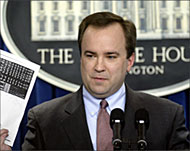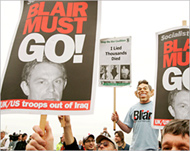US planes pound Falluja
US warplanes unleashed a series of strikes in the Iraqi city of Falluja overnight on buildings claimed to be connected to al-Qaida-linked Abu Musab al-Zarqawi’s network.

The 96 minutes of air strikes on Falluja, 50km west of Baghdad, destroyed safe houses and weapons’ caches used by followers of al-Zarqawi, the US military said in a statement on Tuesday.
“Multiple secondary explosions indicate a significant amount of explosives or ammunition inside the houses,” it said.
The strikes, part of a near-nightly routine in recent weeks, were conducted between 10.55pm on Monday (1955 GMT) and 12.31am on Tuesday, the army said.
The statement made no reference to any possible casualties in the attack.
Washington has blamed al-Zarqawi and his followers for some of the worst violence since last year’s invasion of Iraq.
Falluja’s chief negotiator Khalid al-Jumaili, released yesterday after three days in US custody, said the hunt for al-Zarqawi was a pretext to attack the town, comparing it to US assertions that Iraqi president Saddam Hussein had weapons of mass destruction before last year’s invasion.
Town encircled
 |
|
Scott McClellan: There is concern |
US and Iraqi forces have also surrounded the town of al-Dhuluaiya, north of Baghdad, raiding homes, detaining scores of suspected insurrectionists and calling in helicopter strikes on suspected hideouts in surrounding orchards, Iraqi officials said.
Two Iraqis have been killed and ten others injured in the military operation, Aljazeera has learned.
Residents have also been prevented from entering or leaving the town.
Al-Dhuluaiya is about 20km south of the town of Samarra, where US and Iraqi forces carried out a massive offensive this month to restore control.
There was no word on casualties from either military operation.
Saudi plan rejected
The attacks came as the United States, Iraq and other countries maintain pressure on the United Nations to send senior staff into Iraq quickly to help prepare for the January 2005 elections.
But the White House said on Monday US military commanders and the interim Baghdad government had rejected a Saudi plan for an all-Muslim force to protect UN election staff in Iraq.
“The Iraqi interim government had some real concerns about having troops from a neighbouring country inside Iraq,” said White House spokesman Scott McClellan.
“The multinational commanders also had some concerns about forces operating outside the chain of command structure.”
British troops
Britain is considering a US request to move troops now based in southern Iraq into more potentially dangerous areas to cover for US units battling opposition fighters in Falluja and elsewhere.
 |
|
Troop deployment could reignite |
British Defence Secretary Geoff Hoon said he had not made any decision, but expected a final assessment from his officials next week.
Any such deployment could reignite anger over Prime Minister Tony Blair’s support for the war.
Iraq’s interim administration said on Monday a weapons amnesty that it considered successful in a restive area of the capital would be expanded to the rest of the country.
National Security Adviser Qasim Daud said the cash-for-guns drive in Baghdad’s Sadr City area would be extended two days to Thursday. It was not clear if the expansion of the amnesty across the country would include a cash buyback.
In a country awash with guns, Iraqis are allowed one AK-47 assault rifle a household, and handguns are largely overlooked. But many families possess more than one weapon.